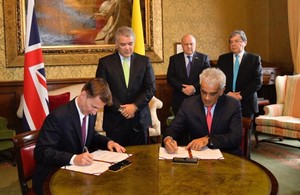Provisional conclusions issued in CMA funerals market investigation
In March 2019, the Competition and Markets Authority (CMA) set out to investigate concerns it had about the funeral services sector following a market study into the effectiveness of competition in the sector. The investigation focused on how people approach the purchase of a funeral under the extremely difficult circumstances following the death of a loved one. A funeral can be a significant cost made during a very distressing time, and so it is important that those who purchase funeral services are confident that the prices are reasonable and the quality is appropriate.
The investigation has identified a number of issues:
- Due to the inherent emotional distress people experience when arranging a funeral, they understandably tend not to spend time comparing providers. They typically choose to use a funeral director that has been recommended or is familiar to them. For crematoria, people generally select one that is closest to them geographically.
- Pricing and product information is not provided consistently by funeral directors in a way that allows people to compare different offers.
- The fees charged by funeral directors and crematoria increased at a rate well above inflation for at least a decade.
- Most people believe that funeral directors are regulated, but that is not the case in England, Wales and Northern Ireland. The investigation found that, although many funeral directors meet good standards, some are providing unacceptably low levels of care of the deceased.
- Regarding crematoria, there are high barriers to entry in the form of the planning regime, as well as building and operating costs, meaning that crematoria are generally few and far between. Most people have little or no choice about which crematorium to use as there is often only one option within a reasonable distance.
The exceptional circumstances of the coronavirus (COVID-19) pandemic, which were unforeseen when the CMA market investigation began, has had a significant impact on the investigation:
- Due to the tragic number of deaths from coronavirus since March, there has been an unprecedented increase in demand for funerals. This has made it difficult to obtain necessary data from funeral directors, crematoria operators and local authorities.
- The restrictions imposed by government during the pandemic has changed the kinds of funeral services available to people. This has also made it challenging to effectively conduct research and testing into possible remedies.
- It is difficult to forecast accurately the future revenue and profitability of funeral directors and crematoria operators. This has significant ramifications for the design and implementation of price controls as a possible remedy.
- Some of the remedies considered by the CMA would need to be implemented by other organisations, such as local authorities, devolved administrations and central government. These have very limited capacity at this time due to the coronavirus.
This combination of circumstances highlights a serious dilemma. On the one hand, it is clear that the funerals sector is not working well and that reforms will be needed. On the other hand, the pandemic has created insurmountable obstacles to some of the solutions needed to design and implement far-reaching reform of the sector at this stage.
The CMA has no legal power to suspend or further extend this market investigation. Some of the remedies the CMA was considering, such as price controls, could not safely be introduced during a national emergency. The report setting out the CMA’s provisional conclusions on this market investigation provisionally recommends that when conditions are more stable, the CMA should consider whether a supplementary market investigation is needed.
The CMA’s provisional conclusions therefore have 3 elements:
- Setting out clearly and fully in today’s provisional report the problems that the CMA has identified in its investigation.
- Identifying the kind of remedies most likely to address these problems, including the introduction of price controls, whilst recognising that coronavirus inevitably means that some of these cannot be designed and implemented in the short term.
- Implementing a set of practical and effective steps that can be taken immediately in order to protect people, such as requiring funeral directors and crematoria to be transparent in their pricing.
The CMA has provisionally decided that, in the short term, it will require all funeral directors and crematoria to provide customers with information on, and the prices of, the various services and packages they offer. This will go a long way to ensuring people have easily accessible information on services and costs to help them decide which type of funeral arrangement they require.
The CMA proposes to continue active monitoring of the funerals sector with an obligation on funeral directors and crematoria to provide the CMA with key financial data every quarter.
Other proposals include a provisional recommendation that the UK Government and the devolved administrations in Wales and Northern Ireland establish an inspection and registration regime to monitor the quality of funeral director services. A similar regime already exists in Scotland.
Martin Coleman, CMA Panel Inquiry Chair, said:
Given the inherently distressing circumstances in which people arrange a funeral, we want to make sure they can be confident that they are not being overcharged and that their loved one is cared for properly – this is what our investigation has focused on.
The later stages of the investigation have been conducted in the midst of the coronavirus pandemic, which has caused a tragic increase in death rates and has materially changed how funerals are carried out. This has had a big impact on how far we can immediately address some of the issues we have identified.
But there are remedies that are feasible and effective in the short term. We are proposing a package of ‘sunlight’ remedies which will shine a light for consumers on the pricing and practices of the sector and make sure that deceased people are cared for properly. This will ensure that the prices of funeral directors and crematoria, and the quality of the service that funeral directors provide, are exposed to greater scrutiny, helping people to make the right choices during an incredibly difficult time.
Further change in the sector is necessary but some of the remedies we were considering could not safely be introduced in the middle of a national emergency. Our proposals will hold open the door to price controls when circumstances created by the pandemic change sufficiently to permit these to be considered.
Notes to editors
Under section 131 of the Enterprise Act 2002, the CMA makes a reference to the CMA Panel Chair to appoint a Group of members of the CMA Panel to carry out a market investigation. The investigation and decisions of the Group are required to be taken independently of the Board of the CMA, and the Board’s oversight and governance role does not extend into the substance of decisions taken by the Group.

